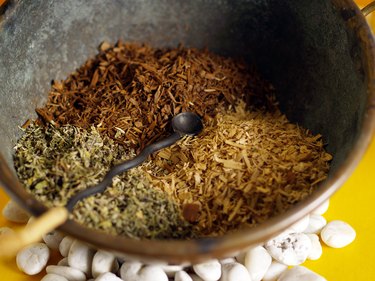
Pausinystalia yohimbe tree bark contains an active chemical known as yohimbine. Yohimbine hydrochloride is sold as a prescription drug, while yohimbe bark extract is available over the counter in health food stores. Most research on dosages has focused on the prescription product. Although the bark extract has much lower amounts of yohimbine than the prescription drug does, the active chemical is associated with numerous side effects. Consult with a qualified health care provider before taking yohimbe.
Uses
Video of the Day
The yohimbe tree is native to Africa, where yohimbe bark has traditional uses for sexual enhancement, according to physician Ray Sahelian, who has a website devoted to natural supplements. Yohimbe may be useful for treating erectile dysfunction and also as a sexual stimulant for women. The Swedish Medical Center Health Library notes that the drug yohimbine is modestly effective and is only successful in 30 to 45 percent of men who use it. Some manufacturers also promote yohimbe for weight loss and include yohimbe in supplements purported to increase athletic performance.
Video of the Day
Considerations
Only a small amount of the active component, yohimbine, is found in yohimbe bark, according to Sahelian, a consideration when choosing a yohimbe bark product. Yohimbe bark powder is not standardized to contain a certain amount of yohimbine, but standardized extracts of yohimbe are available, and they are more potent. Taking a standardized form can help you control your dose of the active chemical, but keep in mind the U.S. Food and Drug Administration does not regulate supplements as stringently as it does prescription medications. Amounts of yohimbine content listed on yohimbe extract products are frequently inaccurate, according to the Swedish Medical Center.
Dosage Options
No quality research exists on yohimbe bark, so safe and effective dosages are not clearly established, according to eMedTV. The website suggests beginning with the lowest dosage recommended on the product label. If you experience side effects, you may want to reduce the dosage. If the product does not work effectively, you can increase the dosage, but not more than advised on the label. The usual dose of the drug yohimbine is 15 to 30 mg daily in divided doses, according to the Swedish Medical Center. Some people experience optimal effectiveness at much lower doses, even as low as 5 mg daily. Taking a higher dose of yohimbe does not necessarily produce better effectiveness, and some individuals will not experience significant benefits for up to three weeks of treatment.
Warning
Yohimbe bark extract can cause many side effects, as noted by the U.S. National Institutes of Health at its MedlinePlus website. They include skin flushing, decreased appetite, dizziness, headache, irritability, nervousness and insomnia. High doses of the chemical yohimbine can cause serious side effects, some of which could occur if you take too much yohimbe. This is much less likely than it is with the prescription drug, since yohimbine content of yohimbe bark extract is generally low. High doses of yohimbine can lead to breathing difficulty, muscle aches, nausea, vomiting, diarrhea, painful urination, genital pain, anxiety, agitation and tremors.
Solution
Because yohimbine is associated with many side effects, check with your health care provider before taking yohimbe bark if you have any chronic health problems or take any prescription medications, advises eMedTV. Additionally, because product quality varies, choose a reputable supplement manufacturer. The USP symbol on the package assures that the supplement has been tested and contains the listed ingredients in the specified amounts.